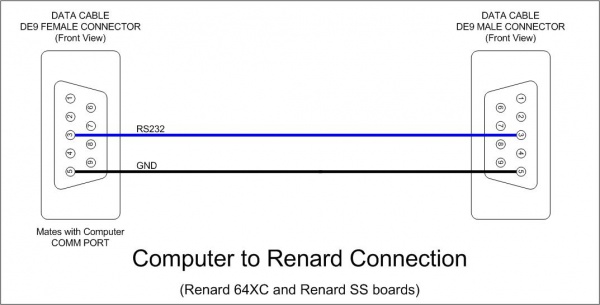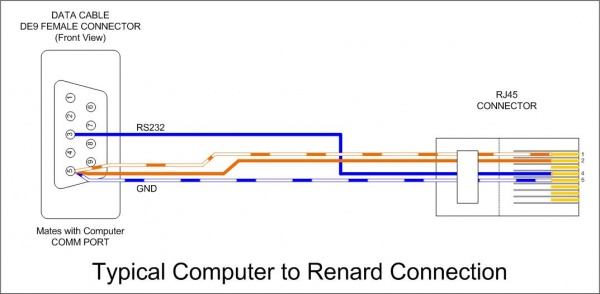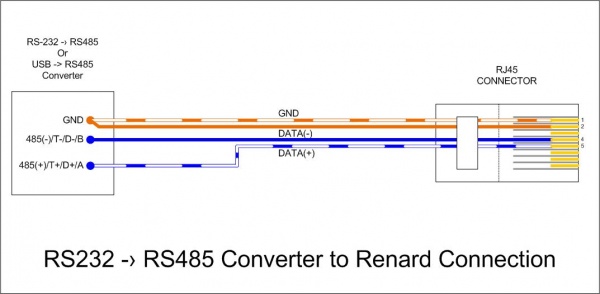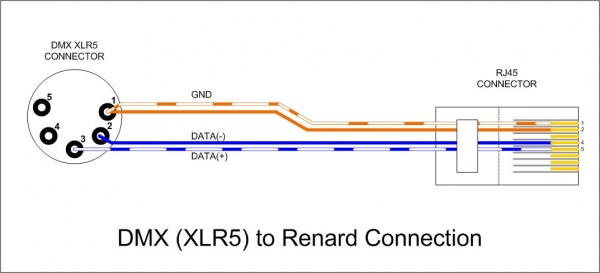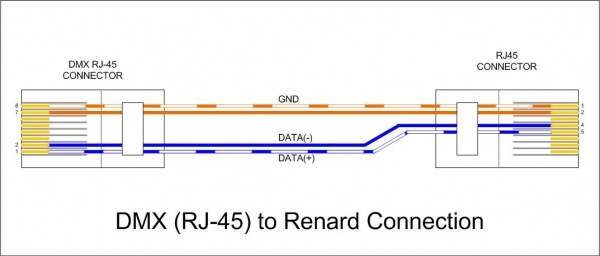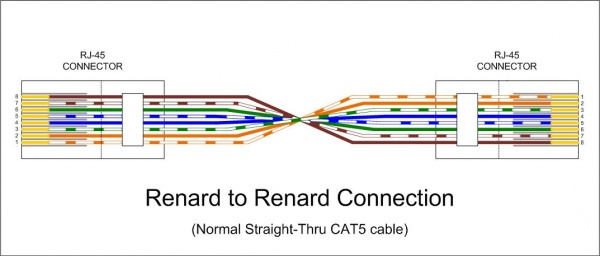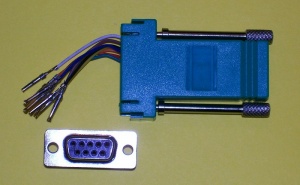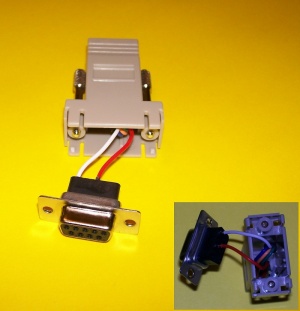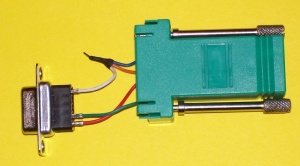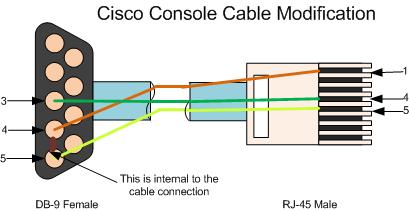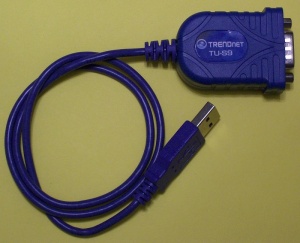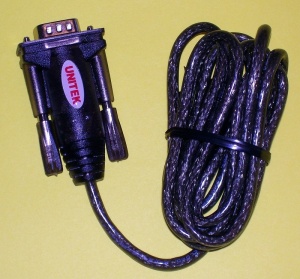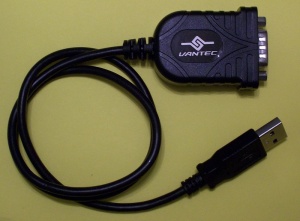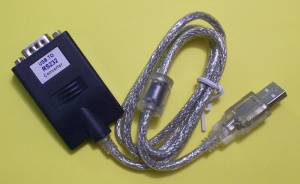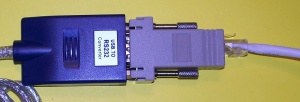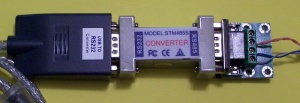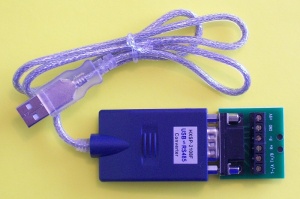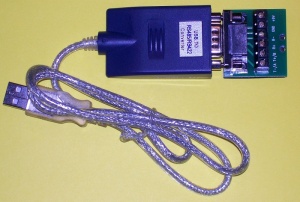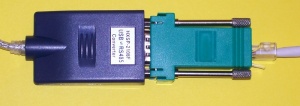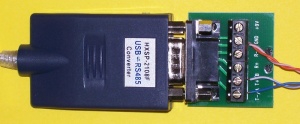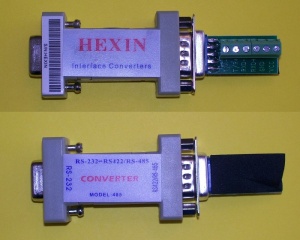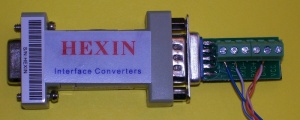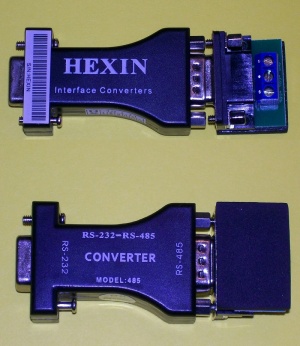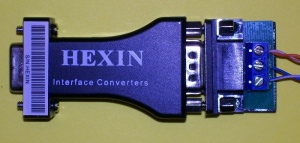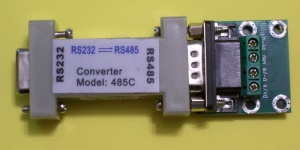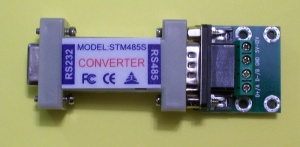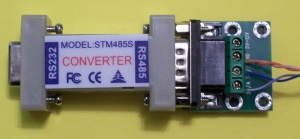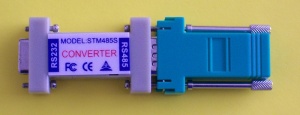Renard Data Cables
The data cables shown on this page apply to the current Renard board designs at DIYC, except the Renard 16 (xmus) which has unique requirements.
Some earlier designs/prototypes may have different cable requirements, when in doubt check the dedicated wiki page for that particular board.
Data Cables
You need to make a special patch cable to connect your lighting control signal source from your computer (PC Serial Port, RS232 USB Dongle, RS485 USB Dongle or DMX USB Dongle) to your Renard controllers. The specific cable you need depends on which port from your PC you are using to send your lighting control signals from. Older PCs typically had a Serial port connector on them (a DE( Male). Most modern computers and laptops do not so you will need some form of USB dongle to send out the signal to your controllers via the adapter cable. The most common adapter cables are listed below.
Directly to computer COMM port (DE9 to DE9 connection)
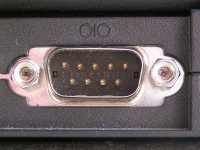 From PC connects to this on Renard controller
From PC connects to this on Renard controller 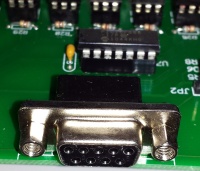
If your PC has a Serial Port commonly known as RS232, then you can connect it directly to the Renard controllers using this cable layout. Serial Port signals (RS232) can be used when the distance between the computer and the first controller is less than 30 ft. If you need a longer distance, then you should look at a RS485 converter which can be used up to 1000ft. You will need to purchase a DE9 male and a DE9 Female connector from your favorite electrical part supplier (Radio Shack carries them) and solder some wire between them as listed below. When setting up the first Renard controller connected to this cable, the Option Selector Jumpers on the Renard Control Board must be set to the Serial settings.
If your PC does not have a Serial Port often known as RS232, then you can use a USB to RS232 Serial Dongle to connect the PC directly to the Renard controllers using this cable layout. Serial Port signals (RS232) can be used when the distance between the computer and the first controller is less than 30 ft. If you need a longer distance, then you should look at a USB to RS485 Dongle which can be used up to 1000ft. You will need to purchase a USB to RS232 Serial converter from an online source. You will need to purchase a DE9 male and a DE9 Female connector from your favorite electrical part supplier (Radio Shack carries them) and solder some wire between them as listed below. When setting up the first Renard controller connected to this cable, the Option Selector Jumpers on the Renard Control Board must be set to the Serial settings.
Mainly for Renard 64XC and Renard SS boards PC DE9 Pin 3 to Renard DE9 Pin 3 PC DE9 Pin 5 to Renard DE9 Pin 5
| Signal | PC DE9 Female plugs into PC Serial Port |
Renard DE9 Male plugs into Renard Controller |
|---|---|---|
| RS232 Data | Pin 3 | Pin 3 |
| RS232 Signal Ground | Pin 5 | Pin 5 |
Directly to computer COMM port (DE9 to RJ45 connection)
 From PC connects to this on Renard controller
From PC connects to this on Renard controller 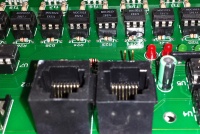
If your PC has a Serial Port commonly known as RS232, then you can connect it directly to the Renard controllers using this cable layout. Serial Port signals (RS232) can be used when the distance between the computer and the first controller is less than 30 ft. If you need a longer distance, then you should look at a RS485 converter which can be used up to 1000ft. You will need to purchase a DE9 male and a RJ45 Plug connector from your favorite electrical part supplier (Radio Shack carries them) and solder some wire between them as listed below. One option for wire is to take a Cat5 or Cat6 jumper cable and cut off one end and solder on the DE9 Female connecter. When setting up the first Renard controller connected to this cable, the Option Selector Jumpers on the Renard Control Board must be set to the Serial settings.
If your PC does not have a Serial Port often known as RS232, then you can use a USB to RS232 Serial Dongle to connect the PC directly to the Renard controllers using this cable layout. Serial Port signals (RS232) can be used when the distance between the computer and the first controller is less than 30 ft. If you need a longer distance, then you should look at a USB to RS485 Dongle which can be used up to 1000ft. You will need to purchase a USB to RS232 Serial converter from an online source. You will need to purchase a DE9 male and a RJ45 plug connector from your favorite electrical part supplier (Radio Shack carries them) and solder some wire between them as listed below. One option for wire is to take a Cat5 or Cat6 jumper cable and cut off one end and solder on the DE9 Female connecter. When setting up the first Renard controller connected to this cable, the Option Selector Jumpers on the Renard Control Board must be set to the Serial settings.
PC DE9 Pin 3 to RJ45-pin 4 PC DE9 Pin 5 to RJ45-pin 5 and pin 1 and/or pin 2
| Signal | PC DE9 Female | Renard RJ45 |
|---|---|---|
| RS232 Data | DE9 Pin 3 | RJ45 Pin 4 |
| RS232 Signal Ground | DE9 Pin 5 | RJ45 Pin 1 and / or Pin2 |
| RS232 Signal Ground | DE9 Pin 5 | RJ45 Pin 5 |
Using a RS232->RS485 or USB->RS485 converter
- Due to the many different types of RS232->RS485 and USB->RS485 converters available, the drawing only refers to the signals coming from the converter. Check the documentation for your converter to figure out how/where to hook up the correct wires.
Converter signal RS485(-)/T-/D-/B/485- connects to RJ45-pin 4 (blue CAT5 wire) Converter signal RS485(+)/T+/D+/A/485+ connects to RJ45-pin 5 (blue/white CAT5 wire) Converter GND signal connects to RJ45-pins 1 & 2 (orange and orange/white CAT5 wires)
An example is shown here with the HXSP-2108F Adapter Hook-up
In a DMX environment
DMX using XLR Connectors XLR connector pin 1 (GND) to RJ45-pin 1 and/or pin 2 XLR connector pin 2 (Data-) to RJ45-pin 4 XLR connector pin 3 (Data+) to RJ45-pin 5 DMX using RJ45 (CAT5) Connectors RJ45 connector pin 1 (Data+) to RJ45-pin 5 RJ45 connector pin 2 (Data-) to RJ45-pin 4 RJ45 connector pins 7 & 8 (GND) to RJ45-pins 1 & 2
DMX(RENARD) to DMX(LOR) using RJ45 (CAT5) Connectors RJ45 connector pin 5 (Data+) to RJ45-pin 4 RJ45 connector pin 4 (Data-) to RJ45-pin 5 RJ45 connector pins 1&2 (GND) to RJ45-pin 6
Connecting multiple Renard boards
Generally only a regular straight-thru CAT5 cable is required to connect a Renard board to other Renard boards. Do not use a crossover cable For the few exceptions (ie Ren24 V2.5), check the wiki page for those boards to see what their unique requirements are.
Adapters/Converters
Note to reader: The following adapters are examples of some of the common adapters that are available on eBay and other on-line sources. All of these adapters were tested during the writing of this wiki page. But since most of the sources for these adapters are in China, the quality of any given product may vary greatly. So while this batch of adapters worked there are no guarantees that future items from China will perform also, so please do not blame the author of this page if you happen to get an adapter that doesn't perform well.
These units are also available from Monoprice.
DE9 to RJ-45 Adapter
- This easy to use adapter is great for converting from the serial DE9 connector on most computers/adapters to a CAT5 RJ-45 connector. This allows you to use normal CAT5 cables to connect your computer to the controllers.
- Below is what appears to be the common color coding for the RJ-45 pin assignments. While all samples that were found during the writing of this article followed the same color coding, you should always double check any adapters that you might decide to use.
- Modification for using this adapter for RS-232
- Remove the wires for unused pins (3-black, 6-yellow, 7-brown, 8-white). Cut the wires off as far down in the adapter as possible because you will need one of these wires later.
- Cut the pins off of wires for pin 1-blue, 2-orange, 5-green.
- Solder the above wires together, along with one of the wires cut off in the first step.
- Use some heat shrink tubing to cover the soldered area.
- Insert the pin on the wire connecting the soldered together wires into DE9 connector pin 5.
- Insert the pin on the red wire (RJ45, pin 4) into DE9 connector pin 3.
- Modification for using this adapter for common RS-485 adapters
- Remove the wires for unused pins (3-black, 6-yellow, 7-brown, 8-white). Cut the wires off as far down in the adapter as possible because you will need one of these wires later.
- Cut the pins off of wires for pin 1-blue, 2-orange.
- Solder the above wires together, along with one of the wires cut off in the first step.
- Use some heat shrink tubing to cover the soldered area.
- Insert the pin on the wire connecting the soldered together wires into DE9 connector pin 5.
- Insert the pin on the red wire (RJ45, pin 4) into DE9 connector pin 1.
- Insert the pin on the green wire (RJ45, pin 5) into DE9 connector pin 2.
DE9 to RJ45 Adapter Cable via Cisco Console Cable (RS232)
- Some people have bought a Cisco Console Cable like this one thinking that it would work as a Typical Computer to Renard Connection unfortunately it will not natively but with this modification it will.
- Cut the existing RJ-45 end off.
- Install a new RJ-45 end with the wires in the following order:
- PC DE9 Pin 3(Green) to RJ45-pin 4
- PC DE9 pin 5(Yellow & Orange) to RJ45-pin 5 and pin 1
USB to RS-232 Converters
- The output connector of each converter above is the same, so the converters are hooked-up in the same fashion.
USB to RS-485 Converters
- Hexin Model: HXSP-2108F
- The output connector of each converter above is the same, so the converters are hooked-up in the same fashion.
Adapter board signal T-/A connects to RJ45-pin 4 (blue CAT5 wire) Adapter board signal T+/B connects to RJ45-pin 5 (blue/white CAT5 wire) Adapter board GND signal connects to RJ45-pins 1 & 2 (orange and orange/white CAT5 wires)
RS-232 to RS-485 Converters
Adapter board signal T/R- connects to RJ45-pin 4 (blue CAT5 wire) Adapter board signal T/R+ connects to RJ45-pin 5 (blue/white CAT5 wire) Adapter board GND signal connects to RJ45-pins 1 & 2 (orange and orange/white CAT5 wires)
Adapter board signal 485+ connects to RJ45-pin 5 (blue/white CAT5 wire) Adapter board signal 485- connects to RJ45-pin 4 (blue CAT5 wire) Adapter board GND signal connects to RJ45-pins 1 & 2 (orange and orange/white CAT5 wires)
Adapter board signal D+/A connects to RJ45-pin 5 (blue/white CAT5 wire) Adapter board signal D-/B connects to RJ45-pin 4 (blue CAT5 wire) Adapter board GND signal connects to RJ45-pins 1 & 2 (orange and orange/white CAT5 wires)
- All the above RS-232 to RS-485 adapters have the same pin configuration of the output connector, so they all can use the same modified DE9 to RJ-45 adapter.
